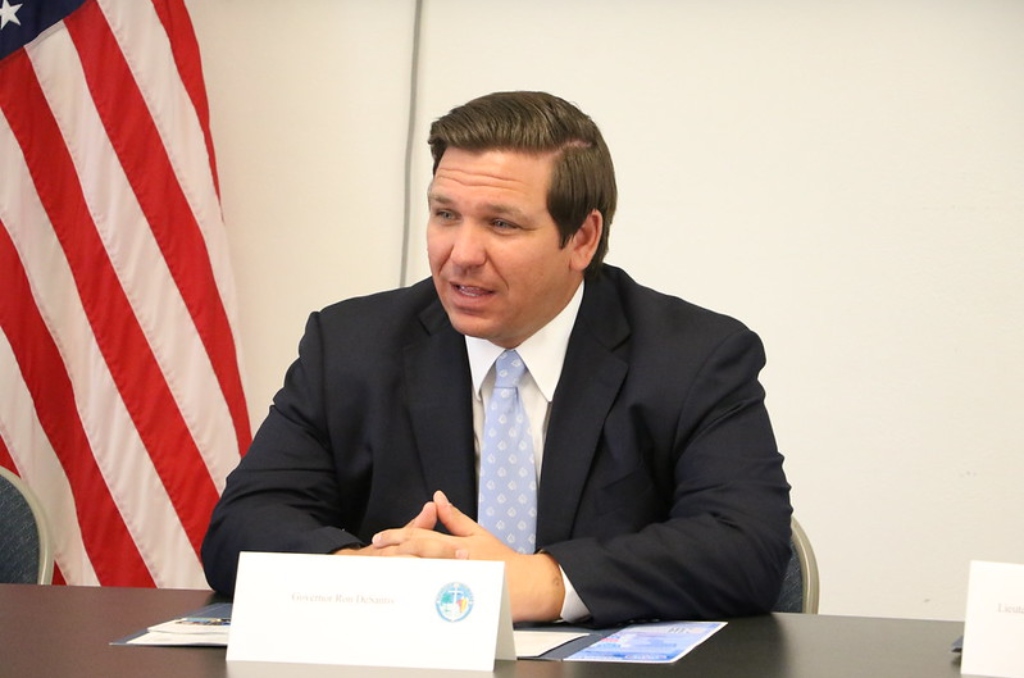On April 16, 2019, Florida Gov. Ron DeSantis visited the U.S. Coast Guard Station Marathon to meet with Monroe County and municipality officials. Photos by Kristen Livengood. Photo and Caption: Monroe County Board of County Commissioners / Flickr
There will be 24 new laws that will go into effect in Florida starting Thursday, October 1.
The changes are among 206 bills that cleared the House and Senate before the session ended March 19. Of those bills, a new state budget was signed into law by Governor Ron DeSantis along with over 200 other laws pending approval by the governor. DeSantis also signed license plate changes into law on a batch on Saturday, September 19.
The process for legislation to become law may be lengthy and takes several steps. Either house may originate of legislation; however, the processes differ slightly between houses. Either a legislator, citizen or a group of citizens or legislators may suggest for a law to become effective.
A legislator sponsors a bill, which is referred to one or more committees related to the bill’s subject. The committee studies the bill and decides if it should be amended, pass, or fail. If passed, the bill moves to other committees of reference or to the full house. The full house then votes on the bill.
If it passes in one house, it is sent to the other house for review. A bill goes through the same process in the second house as it did in the first. A bill can go back and forth between houses until a consensus is reached. Of course, the measure could fail at any point in the process.
Here are some of the laws that will go into effect as of Thursday’s date:
– House Bill 1135
House Bill 1135 revises the state’s specialty license plate program. That includes expanding the potential number of designs from the current 123 to 150 and requiring a minimum of 1,000 sales before new specialty plates can move forward and existing plates can remain in circulation.
– House Bill 387
House Bill 387 sets a $25 fee for most specialty license plates, with a $50 fee for the Auburn, Alabama and Georgia tags.
– House Bill 205
House Bill 205 expands a portion of state law designed to prevent people from misrepresenting service in the military. The bill makes it a third-degree felony to use such misrepresentations to land jobs or political offices.
– State Bill 294
State Bill 294 creates the “Florida Veterans Protection Act” to make it a first-degree felony to obtain or attempt to swindle $50,000 or more from 10 or more military veterans.
– State Bill 680
State Bill 680 expands a 2017 law that increased penalties for people who remove fins from sharks and discard the rest of the sharks in the ocean. The new law bans the import, export and sale of shark fins but includes exceptions for people who already had federal shark fishing permits as of January 1 and seafood dealers who had federal shark dealer permits. Shark fins are considered a delicacy in parts of Asia.
– House Bill 333
House Bill 333 prohibits courts from granting bail to adult defendants who are appealing convictions in cases that require registering as sexual offenders or sexual predators and in which the victims were minors.
– House Bill 675
This bill allows law-enforcement officers to make warrantless arrests for indecent exposure. Currently, officers need to have witnessed the indecent exposure or obtain warrants to make arrests.
– State Bill 1286
The bill makes a series of changes to laws prohibiting contraband at prisons and other types of state and local detention facilities. The bill, in part, adds medical marijuana, hemp and industrial hemp to a list of prohibited contraband. Also, it addresses issues related to cell phones and vaping devices.
– House Bill 133
The new law makes a series of changes related to towing vessels and vehicles. In part, the bill requires local governments to set maximum rates for towing and immobilizing vessels. It also prohibits counties and cities from imposing fees on wrecker operators or towing businesses.
– House Bill 915
This law expands state oversight of 20 commercial service airports, including requiring audits every seven years at the Orlando, Miami, Fort Lauderdale and Tampa international airports. All 20 must post online documents such as meeting notices, agendas and budgets.
Many of the measures taking effect this week keep in place exemptions to state-public records laws. Such exemptions often are subject to repeal unless lawmakers re-enact them.
Chris began his writing as a hobby while attending Florida Southern College in Lakeland, Florida. Today he and his wife live in the Orlando area with their three children and dog.

